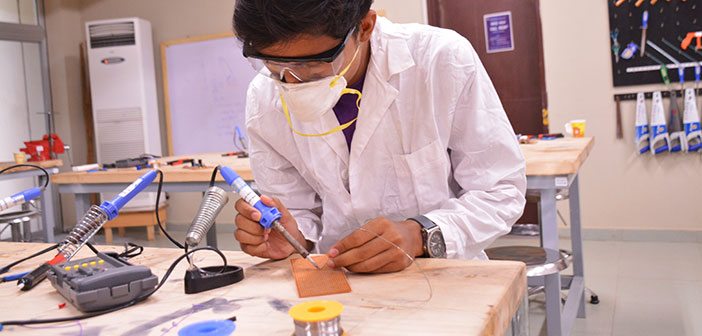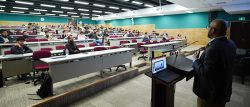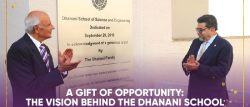A new electrical engineering workshop course promises to equip HU students with the skills they need to build physical devices that can sense and respond to the world
HABIB UNIVERSITY, December 30, 2015: An exciting new course offered by Habib University’s School of Science & Engineering (SSE) promises to give students the chance to play with different materials and technologies and create things from their own imagination.
The 200-level workshop course, titled “Topics in Engineering Design”, will be overseen by Dr. Abdul Basit Memon, Assistant Professor of Electrical Engineering (EE), and Muhammad Musab Jilani, Research Associate with the EE faculty.
Dr. Memon supervised the Engineering Workshop course this past semester, guiding students as they learned how to use the different machines and equipment available at Habib University. His students used different materials – like wood and aluminum – to craft and create nifty objects like a wooden cryptex, an interpretation of Da Vinci’s helicopter and a swiveling lamp shade. This semester, students will be building on those skills with a “hands on from the get-go” course, as Dr. Memon likes to describe it.
Over the course of the semester, students will learn how to use the Raspberry Pi – a small, credit-card sized computer – along with multiple sensor and actuator technologies. The first half of the course will include guided tutorials on how to build a Morse Code transceiver using a Raspberry Pi; a ‘weather station’ that can tell you the temperature, pressure, light, humidity etc; and a Snake-like game that can be controlled with arrow keys, joysticks and/or a gyroscope. Students will be expected to use these learning experiences to propose their own projects for the second half of the semester, and utilize their skills in both mechanical design and electrical engineering to come up with compelling creations.
Dr. Memon expects students to put their project and time management skills to test during the course. He is also hopeful that they will gain an understanding of team dynamics and learn to work together in order to maximize their potential. Another learning outcome is that students will come to appreciate the engineering design process, including but not limited to how an engineering problem can be split up into different smaller modules which can be efficiently tackled individually.
Dr. Memon says the success of Dr. Oliver Faust’s systems engineering projects at Habib University reaffirmed his belief for the need of such a course offering. Dr. Faust had delivered a well-attended public lecture here at HU earlier this month on his experiences teaching electronics in resource-challenged environments. You can read more about his talk here.




